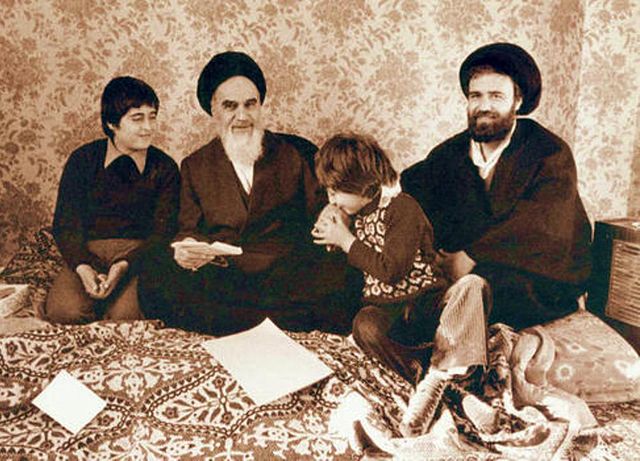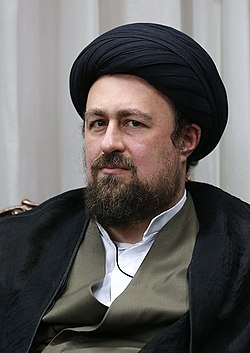Top Qs
Timeline
Chat
Perspective
Hassan Khomeini
Iranian cleric (born 1972) From Wikipedia, the free encyclopedia
Remove ads
Sayyid Hassan Khomeini (Persian: سيد حسن خمينی; born 23 July 1972) is an Iranian cleric.[1] He has been called "the most prominent" grandchild of Ruhollah Khomeini, who had 15 grandchildren in total,[2] and the one "who many think could have a promising political future".[1][3]
You can help expand this article with text translated from the corresponding article in Persian. (February 2024) Click [show] for important translation instructions.
|
Remove ads
Early life

Hassan Khomeini is a grandson of the founder of the Islamic Republic of Iran, Ruhollah Khomeini.[4] He is the son of Ahmad Khomeini and Fatemeh Tabatabai.[5] He has four children.[6]
Career
Summarize
Perspective
Hassan Khomeini became a cleric in 1993.[3] He was appointed caretaker of the Mausoleum of Khomeini in 1995 where his grandfather and father are buried,[2][3] and has had official meetings with officials such as Syrian President Bashar al-Assad and Hezbollah Secretary-General Hassan Nasrallah.[7] He also teaches in the holy city of Qom, and has published his first book on Islamic sects.

He has been described as having "expressed frustration with some policies of a regime dominated by fundamentalists", such as former President Mahmoud Ahmadinejad.[1] In an interview in February 2008, Khomeini spoke out against military interference in politics.[8] Soon after, in what some observers believe may have been retaliation,[1][2] an article in a publication tied to President Ahmadinejad accused him of corruption,[2] "claiming that he drove a BMW, backed rich politicians and was indifferent to the suffering of the poor".[1]
This was "the first time in the history of the Islamic Republic" that one of Khomeini's offspring was "publicly insulted", according to the Iranian daily newspaper Kargozaran.[2] Khomeini met with reformers before the 2009 election[1] and met with defeated presidential candidate Mir-Hossein Mousavi and "supported his call to cancel the election results".[2]
On 9 December 2015, he announced that he would enter politics and run for the Assembly of Experts in the 2016 election.[9][10] His nomination was rejected by the Guardian Council on 10 February 2016.[11]
In June 2020, Iranian media speculated that he would be a presidential candidate in the 2021 election,[11] although he declined to stand on the advice of Supreme Leader Ali Khamenei.[citation needed]
Remove ads
References
Wikiwand - on
Seamless Wikipedia browsing. On steroids.
Remove ads


